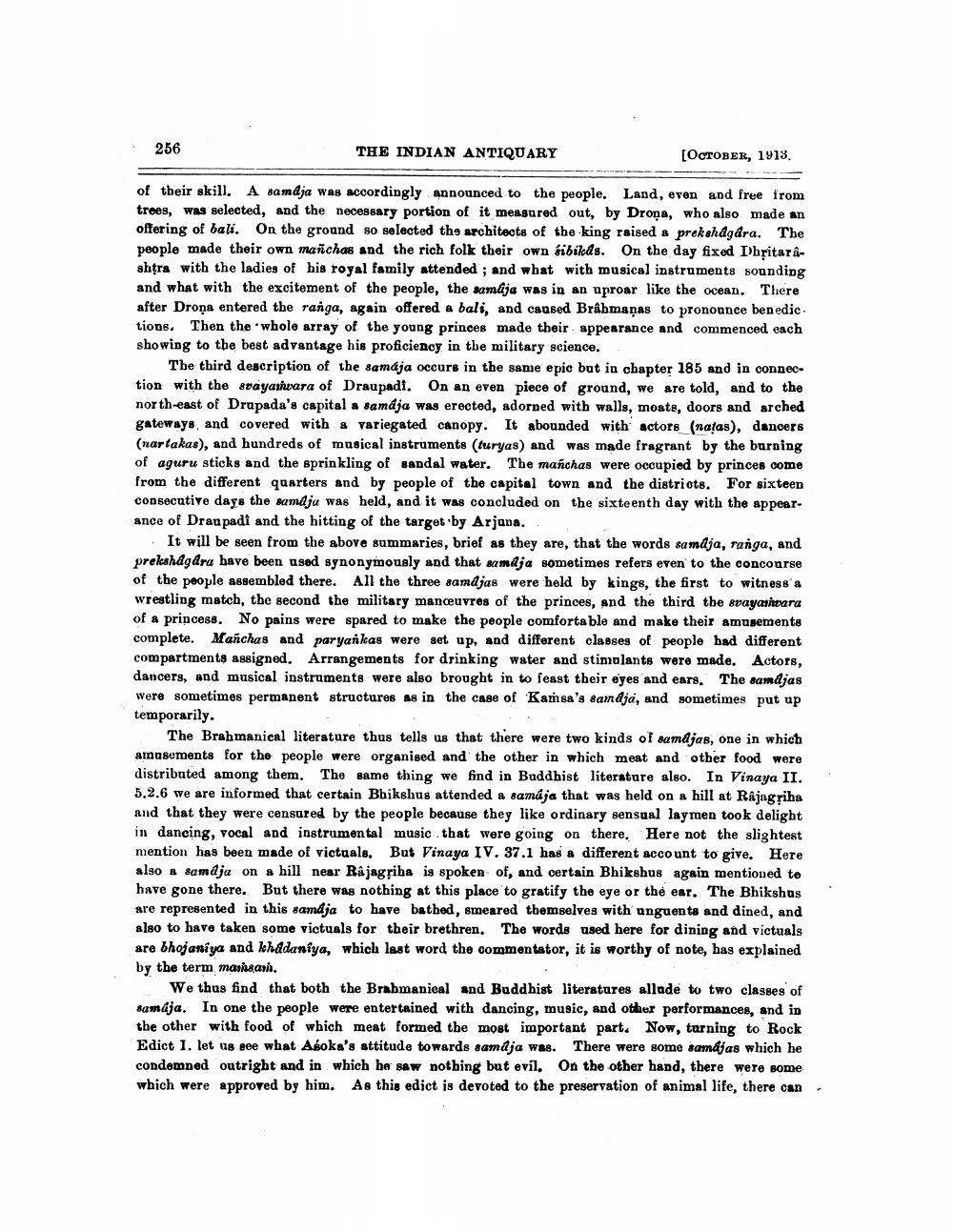________________
256
THE INDIAN ANTIQUARY
[OCTOBER, 1913.
of their skill. A samdja was accordingly announced to the people. Land, even and free from troos, was selected, and the necessary portion of it measured out, by Droņa, who also made an offering of bali. On the ground so selected the architects of the king raised a prekshdgdra. The people made their own manchas and the rich folk their own fibikds. On the day fixed Dhritarashtra with the ladies of his royal family attended ; and what with musical instruments sounding and what with the excitement of the people, the samája was in an uproar like the ocean. There after Droņa entered the ranga, again offered a bali, and caused Bråbmaņas to pronounce benedic. tions. Then the whole array of the young princes made their appearance and commenced each showing to the best advantage his proficiency in the military science.
The third description of the samája occurs in the same epic but in chapter 185 and in connection with the svayashvara of Draupadi. On an even piece of ground, we are told, and to the north-east of Drupada's capital a samája was erected, adorned with walls, moats, doors and arched gateways, and covered with a variegated canopy. It abounded with actors (natas), dancers (nartakas), and hundreds of musical instruments (turyas) and was made fragrant by the burning of aguru sticks and the sprinkling of sandal water. The manchas were occupied by princes come from the different quarters and by people of the capital town and the distriots. For sixteen consecutive days the samd ja was held, and it was concluded on the sixteenth day with the appear. ance of Draupadi and the hitting of the target by Arjava.
It will be seen from the above summaries, brief as they are, that the words samdja, ranga, and prekshdgdra have been used synonymously and that samdja sometimes refers even to the concourse of the people assembled there. All the three samdjas were held by kings, the first to witness'a wrestling match, the second the military maneuvres of the princes, and the third the evayashvara of a princess. No pains were spared to make the people comfortable and make their amusements complete. Manchas and paryankas were set up, and different classes of people had different compartments assigned. Arrangements for drinking water and stimolants were made. Actors, dancers, and musical instruments were also brought in to feast their eyes and ears. The samdjas were sometimes permanent structures as in the case of Kamsa's sandja, and sometimes put up temporarily.
The Brahmanical literature thus tells us that there were two kinds ol samdjas, one in which amusements for the people were organised and the other in which meat and other food were distributed among them. The same thing we find in Buddhist literature also. In Vinaya II. 5.2.6 we are informed that certain Bhikshus attended a samája that was held on a hill at Rajag riha and that they were censured by the people because they like ordinary sensual lay men took delight in dancing, vocal and instrumental music that were going on there. Here not the slightest mention has been made of victuals. But Vinaya IV. 37.1 has a different account to give. Here also a samdja on a hill near Rajagriba is spoken of, and certain Bhikshus again mentioned to have gone there. But there was nothing at this place to gratify the eye or the ear. The Bhikshus are represented in this samdja to have bathed, smeared themselves with unguents and dined, and also to have taken somo victuals for their brethren. The words used here for dining and victuals are bhojaniya and khddanfya, which last word the commentator, it is worthy of note, has explained by the term marisani.
We thus find that both the Brahmanical and Buddhist literatures allude to two classes of samája. In one the people were entertained with dancing, music, and other performances, and in the other with food of which meat formed the most important part. Now, turning to Rock Edict 1. let 118 see what Aboka's attitude towards samdja was. There were some samdjas which he condemned outright and in which he saw nothing but evil. On the other hand, there were some which were approved by him. As this edict is devoted to the preservation of animal life, there can.




